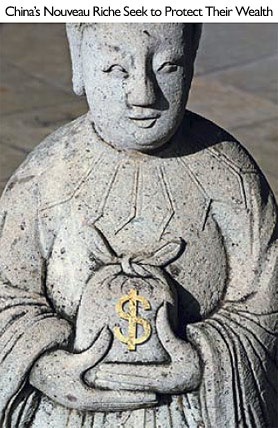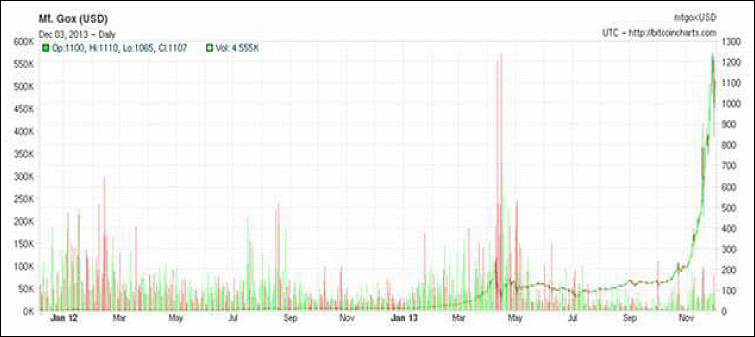China’s extraordinary growth since the Deng Xiaoping’s opening has lifted hundreds of millions of people out of poverty. At the same time, it has also seen the deepening and extension of corruption that was real in prereform China; but before liberalization, corruption had a smaller economic body on which to grow. Just as rapid industrialization has created huge environmental problems for China, at the same time it has raised living standards dramatically. The explosive growth of the economy has generated wealth — but has also generated ever more profound disparities between China’s rich and poor.
Corruption has played a decisive role in that process. And with the new regime seemingly sincere and determined in its anti-corruption efforts, many of China’s wealthiest citizens are not taking chances. They are moving their wealth out of the country — and in many cases, they are moving themselves, as well.
 By various estimates, China’s elite have moved 0 to 0 billion into assets held overseas. Since by law Chinese citizens are permitted to move only ,000 per person, much of the flow of assets out of China is happening illegally, and will be difficult or impossible to track.
By various estimates, China’s elite have moved 0 to 0 billion into assets held overseas. Since by law Chinese citizens are permitted to move only ,000 per person, much of the flow of assets out of China is happening illegally, and will be difficult or impossible to track.
New Fronts In the War to Protect Assets
Further, this movement is occurring at a time of renewed determination by the world’s wealthiest citizens to evade the prying eyes of any authority which could tax or seize their assets. This trend is apparent in the rise of “freeports,” tax no-man’s-lands located near international air and seaports in countries such as Singapore, Switzerland, and Luxemburg. Formally intended as temporary storage for goods in transit, they are becoming functionally permanent warehouse storage for hard assets — precious metals, artwork, wine, and the like.
The Bitcoin Alternative
A related development that has once again come to mainstream news prominence is bitcoin. Bitcoins are a form of electronic currency — stored in a user’s virtual wallet in cyberspace, protected by encryption security as robust as that used by the NSA. Bitcoins are the most widely accepted form of these new “crypto-currencies.” They promise direct peer-to-peer exchange of funds through a mechanism that is — in principle — inaccessible to any state surveillance. Needless to say, this private, virtual way to store and exchange wealth is very attractive to individuals who wish to conceal their assets and their financial activities from governments, which cannot currently monitor the bitcoin world as they can monitor traditional banks and exchanges. We would not be surprised to discover that much of the current spike in bitcoin prices has been driven by Chinese demand, just as a spike earlier in the year may have been correlated with the collapse of the Cypriot banking system. In that case, perhaps, it was corrupt Russian money looking for a possible safe haven in cyberspace.
Chinese Buyers Behind Bitcoin’s Spike?
Source: Bitcoin Charts
So ahead of what they may fear will be a persistent anti-corruption effort, some wealthy Chinese are looking for ways to move cash out of China. Probably only a small part of it is in esoteric instruments like bitcoin: much is in straightforward investments such as U.S. and European real estate. Chinese Wealthy Join the Global Elite In a global context, this is nothing unusual; this is what very wealthy individuals do. One analyst observed that the average wealthy citizen in the world domiciles 20 to 30 percent of their wealth outside their home country — versus an estimate of only 13 percent for wealthy Chinese. It may not be what the Chinese government wants, but it is the way of the world.
Passports for Sale
Chinese millionaires themselves are also emigrating, sometimes drawn by countries seeking to attract Chinese wealth for their own purposes. Buying €250,000 of Hungarian bonds will get you a Hungarian passport, and a similar program for “significant investors” is being rolled out by Australia. Wealthy Chinese have many reasons to seek residency and citizenship abroad besides the desire to protect their questionable gains. Such legitimate reasons include the desire to escape the environmental degradation of China’s big cities, and the desire to provide children with access to western education. A recent survey indicated that more than half of China’s millionaires are considering emigration.
What the Exodus Means
If this exodus continues or accelerates, its effects will depend on whether or not it is primarily the movement of an elite created by corruption, or the movement of a genuinely productive elite. If ill-gotten gains exit China together with their owners, as part of the Chinese government’s long-term crackdown on corruption and attempt to cultivate the rule of law — that bodes well for China. As China moves forward we will monitor the progress of anti-corruption efforts, and expect to see new leadership encourage China’s longer-term economic growth. We believe that Xi Jinping and Li Keqiang will succeed in shaping a China more responsive and amenable to the desires and aspirations of its people. However, we don’t believe that charting the exodus of wealth and the wealthy is relevant in determining the future of China’s growth patterns.
For more commentary or information on Guild Investment Management, please go to guildinvestment.com.






